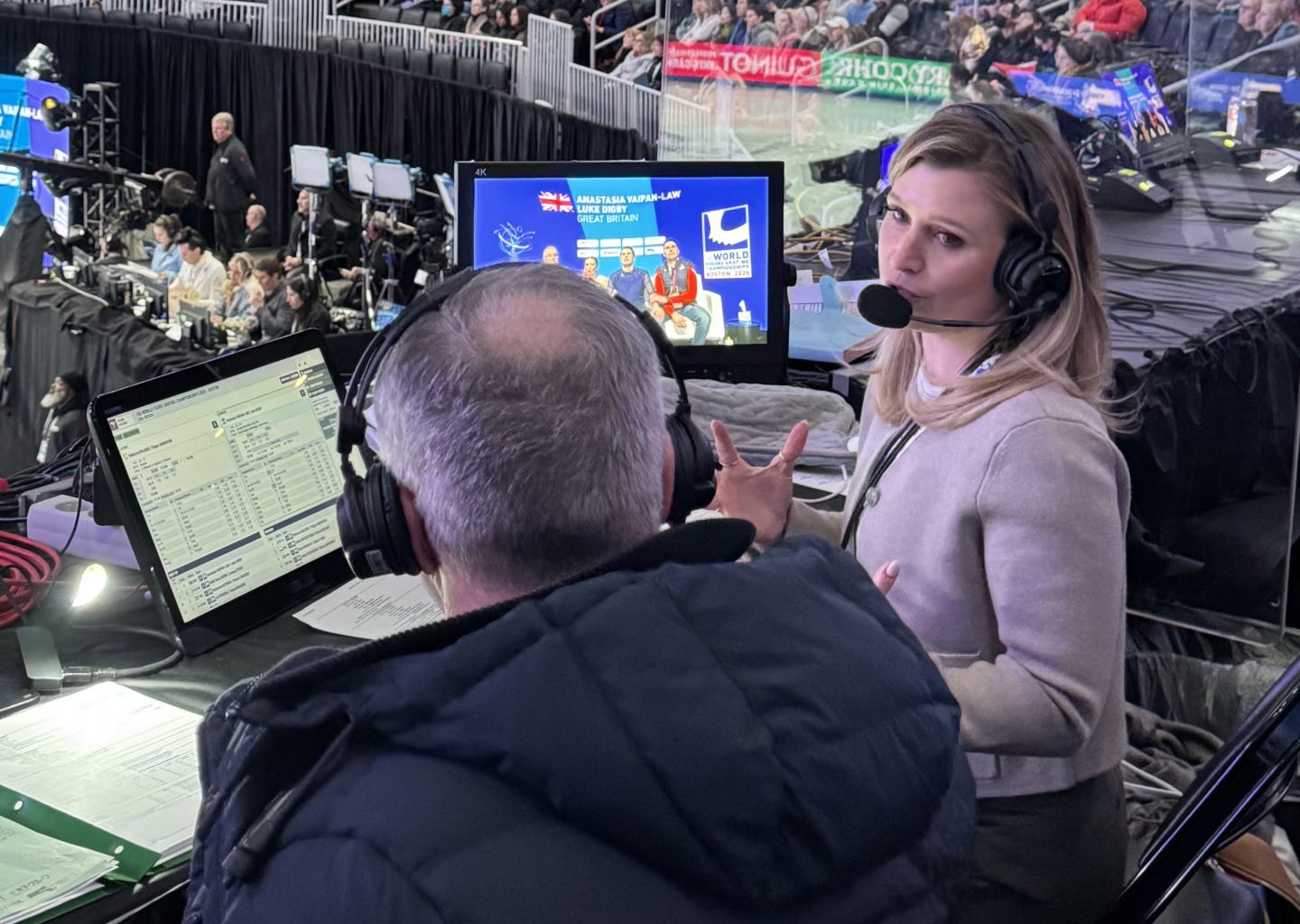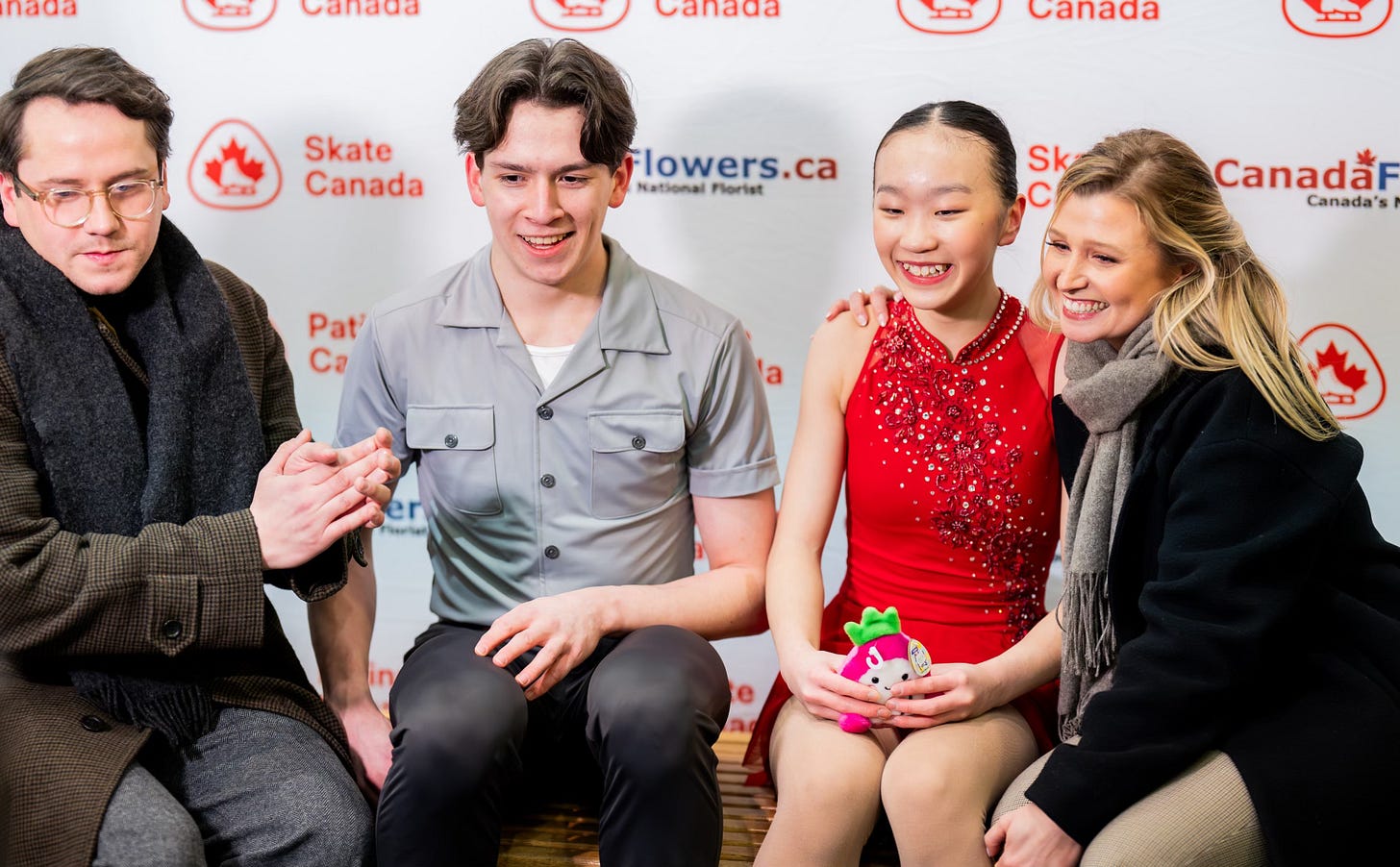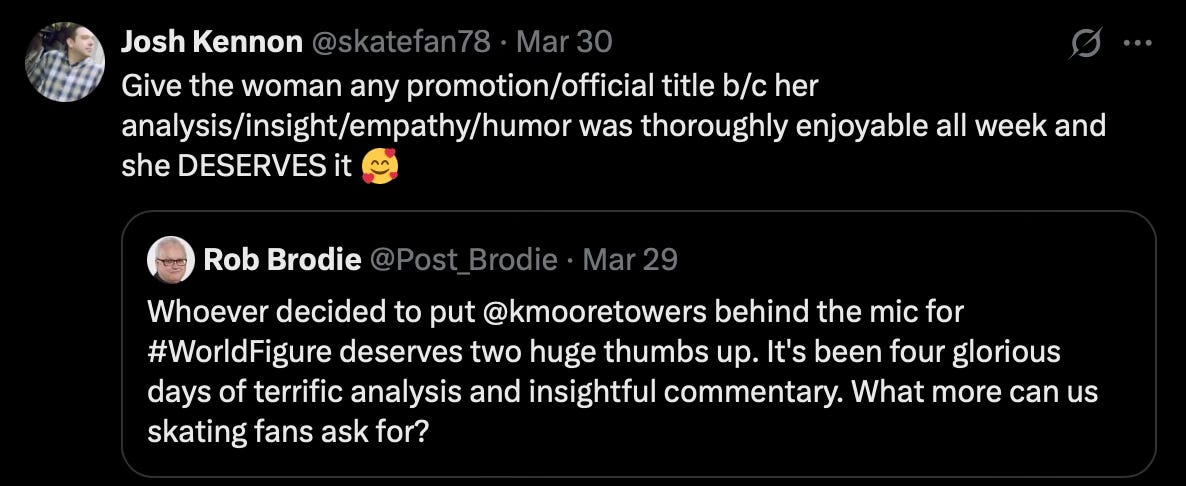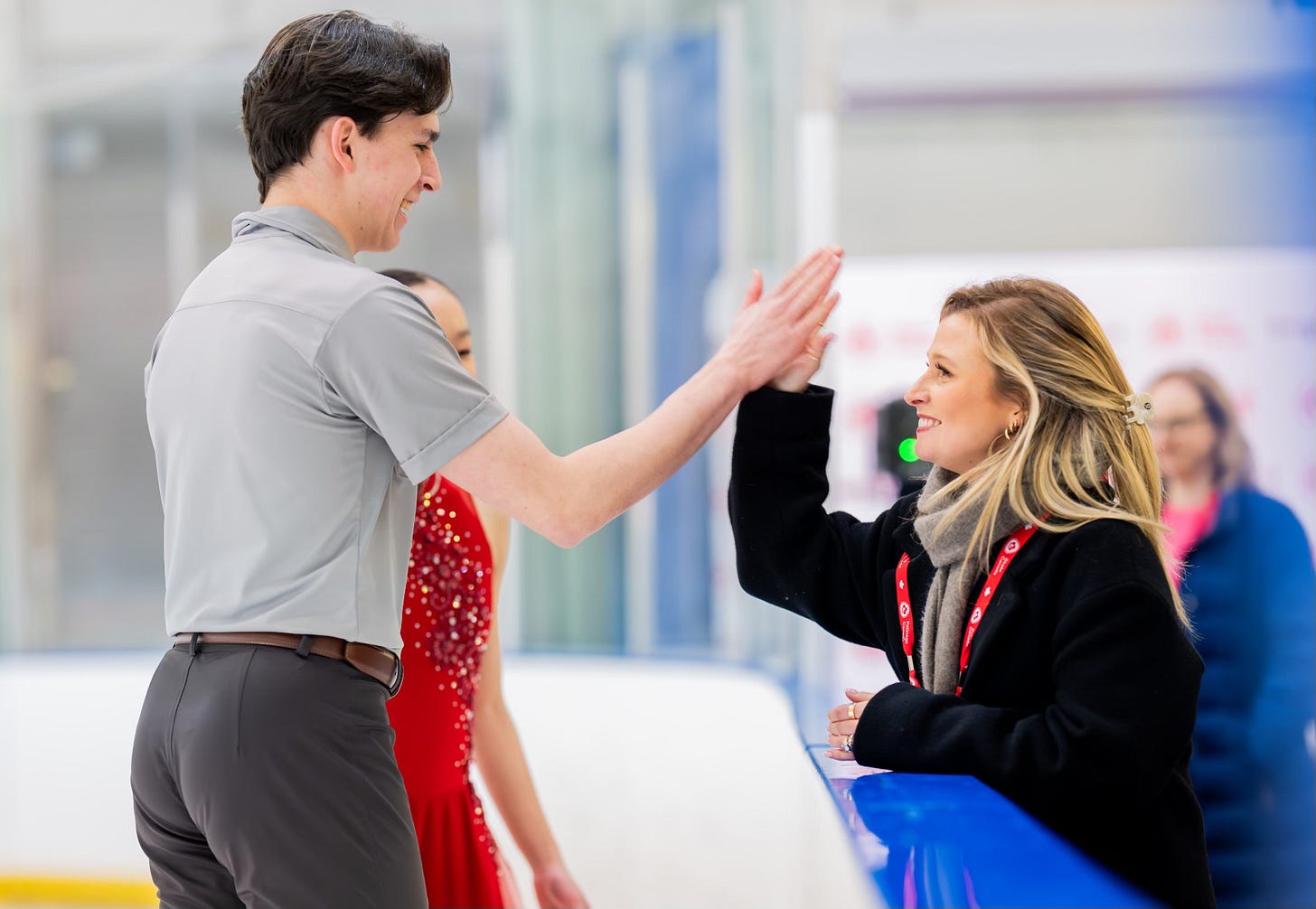Meet the Canadian breakout star of #WorldFigure
Kirsten Moore-Towers shared skating insights with fans around the globe in Boston, and it's a career path she's keen to continue in the years ahead.

You might say Kirsten Moore-Towers has always known — especially when the subject is figure skating — that she has the gift of gab. Even in the early, formative years of her life, talking about a sport she would come to adore held a certain kind of attraction for her.
“You know what? It goes even beyond that. When I was a kid, and people asked me what I wanted to be when I grew up, I told them I wanted to be a choreographer and a commentator,” the 32-year-old Canadian said when asked about her newest career path. “And I’m thrilled to say I’m doing both of those things (more on the second part of that in a bit).
“So yeah, for a long time I’ve wanted to do this. I’ve always really enjoyed public speaking and telling stories and advocating for things that were important to me. It was a big part of my career, especially in my later years, and I think this felt really just like a step that made sense.”
She speaks, of course, of the road that led her to Boston for the 2025 World Championships last month, where she shared commentary duties alongside former British champion Chris Howarth in that electric atmosphere inside TD Garden, on the International Skating Union’s streaming feed that was shared across the globe. It was a huge step forward in that realm for the four-time Canadian pairs champion and three-time Olympian, who had first cut her teeth in broadcasting at for Skate Canada at domestic events.
But it’s the kind of leap that was hardly surprising to Ted Barton, the head of Skate Canada Productions and longtime voice of Junior Grand Prix events. Barton recruited Moore-Towers as part of his commentary team two years ago — she made her debut as a pairs analyst at novice nationals in February 2023 — and is a big fan of the way she goes about her work.
“Kirsten is a real competitor, in everything she does. She wants to be extremely well prepared,” said Barton, whose decision to bring Moore-Towers on board as a guest commentator for the Junior Grand Prix series, which he works with well-known British voice Mark Hanretty, turned out to be a fortuitous one (she worked from home at the JGP event in Türkiye).
Her efforts caught the eyes of Glen MacKay of Infront Productions, a Switzerland-based company that produces television and streaming broadcasts for the International Skating Union and, as such, hires the on-air talent. Eventually, a conversation happened between Barton and MacKay.
“Glen got in touch with me and he said, ‘I really like Kirsten Moore-Towers, and was looking for a woman to join the team in Boston. Do you think she can do this?’ And I said, you won’t get anybody more prepared for this,” said Barton. “This would be off her radar, so first of all, she’d be tremendously honoured. She would do it, and she’d be extremely well prepared.”
She also had the endorsement of Hanretty, a popular play-by-play voice among skating fans who wasn’t available to be part of the commentary team in Boston. Even with all that, there was an interview process to go through before Moore-Towers landed the plum gig. But having two well-respected voices backing her certainly helped her cause in Infront’s eyes.

“Mark had heard some of my work and so generously put my name forward. And I understand Ted Barton vouched for me as well,” said Moore-Towers, who calls Barton her biggest supporter. “He is so passionate about this sport and about telling the stories of the sport and trying to reach a greater audience. He also has been amazing in mentoring me and showing me the way, and I’m really grateful to him for that. He was one of the biggest contributors to my start in this world.
“I was so nervous (in Boston) and it was my first time doing all four disciplines at a high level like this. But I was excited for the challenge.”
It helped to have the steadying hand and voice of Howarth right beside her. Right from their first production meetings in advance of Worlds, the two hit it off and with each passing night in Boston, they developed a rhythm and a chemistry that made for an enjoyable listen for fans not at TD Garden.
“Chris was amazing. He took it upon himself to schedule a call (before Worlds) and answered any questions I had. And then when we got there, it felt comfortable very quickly and we really enjoyed this working relationship,” she explained. “He is such a consummate professional with how the production happens … I felt that I learned from him as the days went on.
“He has such a unique style that is different to mine, and I think that’s okay and a team works well in that regard. Every day that we worked together, I just learned more and more from him about the timing of how and when to say things and and how to be concise and effective. Chris is so good at getting an exciting point across in five words, right? And that’s such an amazing skill, because of course, we want the artists and the athletes to tell their story as much as possible without (us) jumping in and disrupting what they’re trying to show us.”
Moore-Towers’ biggest contribution, at least for this observer, was her ability to break down each skater’s performance in a technical way that made the judges’ scores make more sense. It’s something she understands can be a sore point with the skating fan watching from home.
“(Seeing certain scores) can be frustrating as a figure skating fan who has perhaps less lived experience or less knowledge, maybe, of how the levels work and how the scoring system works. It can be really frustrating to watch your favourite skater and not understand why (their score) happened,” she said. “And so it felt important to me to explain how Grade of Execution is earned and how the components are earned.
“And if I saw something that I knew maybe an untrained eye wouldn’t pick up on, especially in pairs, it felt important to me to call it out so that you might know when the score is vastly different, sometimes it takes only a tiny little movement or misstep, for a score to change drastically. Chris was so amazing at telling these stories … and I felt like what I could add to that expertise was a little bit more of a technical analysis.”
Barton is a big believer in conveying “just enough information, but not too much,” and he thought Moore-Towers hit the sweet spot in that area.
“She’s a former competitor and she gets it, but talking about things like missing out on levels and this (performance) wasn’t quite what it should have been, by the time the marks came up, you were like, ‘yeah, I could get that. I understand why that was like that,’” he said. “And she didn’t have to go into too much detail about, which feature did you miss to drop the level from four down to two? Because if you go down that rabbit hole in trying to explain it exactly, then you’re going to confuse everybody. She just did a perfect mix of enough information, but not too much information.”
No matter the sport, former athletes who moved into a TV commentary role can also struggle with this balance — providing the critical analysis viewers demand, especially when it might involve an athlete they know personally. Moore-Towers says she’s very cognizant of trying to thread that needle.
“I still think I have a hard time walking the line of having so much respect for the skaters and the work that they put in, and trying to honour that, but also trying to educate the audience in a way that is fair and makes sense,” she said. “Especially when I’m working for Skate Canada and I know every single person and a lot of skaters that I’m speaking on. I can feel like a lot of pressure to, first of all, do them justice, and second of all, be constructive in a way that doesn’t make the athlete or the teams feel bad, right? Which can be challenging, especially when you have a personal connection.”
(a prime example of that: ice dancers Carolane Soucisse and Shane Firus, who represent Ireland and happen to be her brother and sister-in-law).
It’s why she professes an admiration for Tracy Wilson, one of the most distinguished commentators the sport has even seen, who eventually moved on from her TV work to become a full-time coach at the Toronto Cricket Club (her current top students include Jason Brown and Kaiya Ruiter).
“I’ve always found her to be so professional and respectful, and she obviously has such an immense knowledge and years and years of experience in the sport that she can speak to it in such an eloquent way and if you didn’t know, you’d never know that she worked with a lot of the athletes that she is commentating on,” said Moore-Towers. “Though I don’t teach anyone that I commentate on … yet, I have a personal relationship with a lot of them, and so I drew a lot of inspiration. And honestly, I have so much respect for Tracy for how she went about doing that job. She was a fixture in the broadcast world for literally decades.”
Now, it’s also pretty obvious why Wilson was always completely in her comfort zone discussing all the nuances of ice dance — she earned bronze medals in the discipline at three World Championships and the 1988 Calgary Olympics, along with seven Canadian titles. For Moore-Towers, however, it’s the one discipline that was mostly foreign to her.
She chuckles when asked what it took for her to sound like an expert when talking about it in Boston. Let’s just say a lot of time was spent watching YouTube videos, checking skaters’ social media feeds and taking deep dives into that most excellent of databases at skatingscores.com (which has also become one of this Substacker’s very best friends).
“I have a lot of friends in ice dance and so through my friends and even my family, I’ve learned through the years a little bit more, and I’ve always been a curious person. I like to learn about things I’m interested in and passionate about,” said Moore-Towers, who credits former ice dancers Kaitlyn Weaver, Jean-Luc Baker and Kaitlin Hawayek as being among her top resources. “I think I logged somewhere between 27 and 30 hours of research on ice dance alone because I care.
“I don’t have that struggle with pairs. I still prepare for pairs. I still study up on the levels and I study up on the athletes and their stories, but it’s more like the back of my hand. I also teach pairs. So I’m practising these rules every day of my life. This plays a role in what I do, but in dance, I just don’t have that experience or that practice, and so I was so nervous, and I just wanted to do the athletes justice. I think they deserve somebody to tell their stories and talk about their programs, who respects them enough to have done the work and done the research to do a great job.
“So I really just tried my best to use my own personal resources and to get as much prep in as I could so that when it came down to it, I could explain it in a way that helps the audience understand because it’s not like the other disciplines … it can be so hard to understand and then that can be frustrating, right? We want to keep contributing to the fans of figure skating and try to continue to grow the fan base, and if the fans don’t understand what they’re watching, then it can be frustrating to keep watching.”
While the days were long at Worlds — counting practice time, Moore-Towers was at TD Garden from 6:30 a.m. to 11 p.m. — the skating junkie inside her “just loved it. I am a skating fan through and through, so I genuinely do enjoy watching that much skating. I was exhausted, but it was a blast.”
It’s a sentiment that was clearly shared by everyone involved in the broadcasts, and it’s why Moore-Towers has a thirst for more of these opportunities. During the ISU Skating Awards, which were held in conjunction with Boston Worlds, she had conversations about “future opportunities” to continue her work for the ISU.
Barton also shared this anecdote: “Glen (MacKay) sent me an email and said ‘wow, she was awesome. And thank you so much for supporting her and also for her training and experience in Canada because it gave her a lot of confidence going in.’ And yeah, I thought she was great.”
“Hopefully, there will be more opportunities coming my way, but we’ll see. Nothing is confirmed yet. But I certainly would love to go to Prague (for 2026 Worlds),” said Moore-Towers. “It’s great to be around people who are so passionate about what they do and who love it so much that they want to share this joy. I’ve always said this since I’ve started — and it’s only been a couple of years — I just love this sport so much that I enjoy having a platform to tell other people why they should love it, too.
“Especially with pair skating, because I do feel like we see the least amount of entries in pair skating, kind of across the board at all events. And I feel, personally like it’s the discipline that is known the least about, and because I love it so much, I just really relish the opportunity to talk about why it’s so great. So yeah, I appreciate every opportunity that I get to do that.”
She was also heartened by the largely positive feedback she saw from fans on social media about her work (again, this observer is totally on board with that sentiment). Like, for example, these comments that were directed my way:
“You know, there’s a learning curve. You can’t be great at everything the first time you try it. And I’m not insinuating or suggesting that I was, but the feedback that I got from both our team that hired me and also from the general audience and the social media … you can read some great stuff and you can read some pretty bad stuff that’s a little bit harder to swallow as well,” she said. “So I was nervous about that. I care a lot about what I do, and I put a lot of work into it, so of course, I want people to like it.
“At the same time, I know you can never please everybody, and everybody prefers a different style of commentary or way to watch their sport, but I’m happy to say I saw mostly great stuff. And as I was seeing that, I was even more encouraged to keep going for it. That encouragement from both the people that are close to me and also strangers that I had never met before were really encouraging to me, and I really appreciated hearing it.”
Lest you think that Moore-Towers’ skating season ended in Boston … well, guess again. She’s a six-day a week coach at the Connaught Skating Club in Richmond, British Columbia, just outside of Vancouver, where she resides with husband Liam Firus, a 2014 Canadian Olympian, and her dogs. She and Firus, who now works in the finance industry, were married in June 2024.
(a quick aside: the “professional dog petter” title that Moore-Towers often includes in her social media bio still very much applies. “I actually still feel very strongly about my dog petting,” she says).
Moore-Towers says her husband “has put on a pair of skates once since he retired in 2018, seven years ago. He has an office here in our house, and also works in his office downtown sometimes, and he loves it. He likes the challenge, and it’s fun for us that we come to the dinner table with such vastly different days and vastly different experiences. And yeah, he’s doing amazing. I’m so proud of him.”

Moore-Towers was still an active skater, back in December 2021, when she was recruited by Connaught coaches Keegan Murphy and Jacob Cryderman to help grow a pairs program at the club (she believes they were aware that she planned to move out to Vancouver to live with Firus after her competitive career, which ended following the 2022 Beijing Olympics).
“Jacob had started the (pairs) program along with Eileen Murphy a number of years ago, I believe in 2018 and they just kind of wanted an opportunity for some of their athletes that was a little bit different than what singles provided for them,” Moore-Towers said of the Connaught club, which is the training base for 2024 Canadian champion Wesley Chiu. “And at first I said, well, coming out of competitive skating, I don’t want to lock myself into one place right away. I want to see what’s out there.
“So I started on a kind of a consultant basis, and I just loved it so much that without really even trying, it became more of a daily part of my life. Last year, they asked me to take over the directorship and run the (pairs) program, and so this is a very new role for me. I still am learning every day that I’m on the job as a coach and as a director.”
Since her arrival there, the club has grown from two pair teams to eight and there’s quality to go along with it. Two of the teams that Moore-Towers coaches ended up on the podium at the Skate Canada Trophy novice nationals in Edmonton. Jasylnn Wong and Nico Conforti skated to the gold medal, while Ava Cheung and Stephen Lee took the silver.
“The teams are doing fantastic … we’ll have three teams going junior (next season), and it’s an incredibly steep learning curve for them and for me, but it’s a blast. I love the challenge and it’s been so nice to be involved in athletes’ lives on a daily basis, because the investment level is so different,” she said. “I love teaching seminars, and I love bringing energy into a club for a weekend at a time, but it really changes when you’re there (every day).
“You really know these kids and you know their passion and their love for what they do and for this sport, and it feels like such an honour to me to help contribute to their experience in it. And regardless of their results, I hope that they'll be able to look back on this in 20 years and think, what a great experience they had learning this new cool thing. And that feels like an incredible responsibility to be a part of that.”
Like any former skater who transitions to coaching, Moore-Towers admits “it’s tough” being on the other side of the boards. It’s also caused a bit of a rethink in how she sees the sport from now an entirely different perspective.
“Coaching is just a different animal, I think, because also we take so much ownership of how it goes. If they have a skate that is not their best, then we’ll spend a lot of time as coaches trying to think of what we could have done better or different to help them to do their best job, which is so interesting,” she said. “When I was an athlete, this is not something I ever thought about. If I had a bad skate. I never got off the ice and thought, ‘well, my coach didn't do this.’ But I think it's all a part of being a person who’s passionate about what they do.
“We’re always trying to help them be their best. And in order for that to happen, I think we feel like we need to be our best. All of these kids need something different … but it can be so challenging to figure out how to be that different person for each of them. I had great coaches in pairs, and I also had some coaches who coached with a style that I maybe wouldn’t want to emulate. A lot of my pair years were very difficult from a mental health perspective, and it’s so important to me now to be somebody that I may have needed when I was struggling with that.
“Incredible, incredible responsibility, but an incredible honour to be a part of their lives and to help them not only be great athletes, but to help them learn life skills. We learn so much in figure skating that goes beyond what we do on the ice, and these kids are young. They have so much life ahead of them, and it feels so important to help them walk in the world as incredible people, and not just incredible pair skaters. And I really love that part.”







